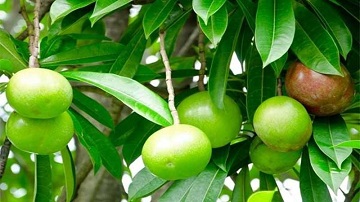A Group of IPB Students Synthesized Plant Extracts Bintaro Fruits as Biopesticide (Natural Insecticides)

One of the most potent alternative pesticides in controlling pest populations is natural pesticides from plants or Biopesticides. They are obtained from organisms including plants, bacteria and other microbes, fungi, nematodes, etc. They are often important components of integrated pest management (IPM) programmes, and have received much practical attention as substitutes to synthetic chemical plant protection products (PPPs). Many plant species produce substances that protect them by killing or repelling the insects that feed on them. For example, Bintaro (Cerbera manghas L.) has a special sap that wards off or kill insect pests if it is attacked. This question inspired three students of the Faculty of Agricultural Technology (FATETA IPB) and a student of Faculty of Mathematics and Natural Sciences of Bogor Agricultural University (FMIPA IPB) science project theme: Can insecticides be created out of natural sub stances. Organic, plant-based pesticides that rely on plants' natural defenses against insects may not only be effective and inexpensive for protecting crops, but also safer and more environmentally friendly. The group consists of Afrinal Firmanda, Awan Karuniawati, Dewi Ratnasari and Hutri Maigita.
"I produced natural pesticides from Bintaro Extract (Cerbera manghas L.). Research has shown that Bintaro successfully repel insects and also cause rat poison. To answer the question I and my group proposed to implement the research project on '‘Pembuatan Gel Biopestisida dengan Ekstrak Bintaro (Cerbera manghas L.) sebagai Pengendali Hama Gudang = Biopesticide Gel from Bintaro Extract (Cerbera manghas L.) for the Control of Storage Pests'," said Afrinal Firmanda as chairman of PKM Group.
A warehouse is a commercial building for storage of goods. Sometimes warehouses are designed for the loading and unloading of goods, to distribute traded goods. According to FOOD and Agriculture Organization (FAO, 2015) Postharvest loss can be defined as the degradation in both quantity and quality of a food production from harvest to consumption. The loss to stored grains or other products by insects or rodents is of high magnitude in Indonesia. It will be the economic loss since any grain or other stored products attacked by an insect suffers not just losses in nutritional quality but also becomes unfit for marketing and for use as seed. List of pests that are considered as primary pests of stored products are insects, rats, birds and other microorganisms.
Afrinal explains, various techniques are used to control insect pests in stored products from sunning and smoking on the traditional farm to irradiation in large-scale bulk handling. Pesticides, particularly an insecticide that can be applied to control pest of stored products. The Insecticides are usually specific, and do not kill all insects and mites; choose a chemical approved for use in stores and/or on stored products that has either a "broad spectrum" or specific toxicity to moths and beetles. Mites may require special treatment. Insecticides usually show some degree of toxicity to humans, domestic animals, poultry, etc. and must be used with caution. Excessive use of pesticides will lead to secondary pest resistance.
Bintaro tree is often referred to as Mango Laut, Blind Rhino, Babuto, and Wood Octopus. It has been known as poisonous tree. Bintaro occupies coastal habitats and is often associated with mangrove forests. Almost all parts of Cerbera manghas such as roots, stems, leaves, fruits and seeds which contain flavonoid compounds, tannins, saponins and steroids have been utilized for many purposes. The leaves and the fruits contain the potent cardiac glycoside cerberin, which is extremely poisonous if ingested. The fruits are used for manufacturing bioinsecticides and deodorants. The leaves of Cerbera manghas also showed cytotoxic activity against two breast cancer cell lines. Among all the parts are bintaro fruit and seeds that contain toxins, making it harmful to humans and animals. Bintaro seeds contain a catechoid / alkaloids (cerberine, cerbroside, nirifolin and theven) steroids, tripenoids and saponins. This alkaloid group compounds are toxic, as they grouped into the vegetable pesticide.
Biopesticide gel is used to evaporate active compounds Cerbera manghas at room temperature. Compounds that act as biopesticides are obtained through the extraction of bintaro fruit. The results showed the use of Cerbera manghas extract which is still not utilized optimally. So that gel-based product innovation with a mixture of Cerbera manghas plant will overcome the biopesticides for storage pests. (Wied)



